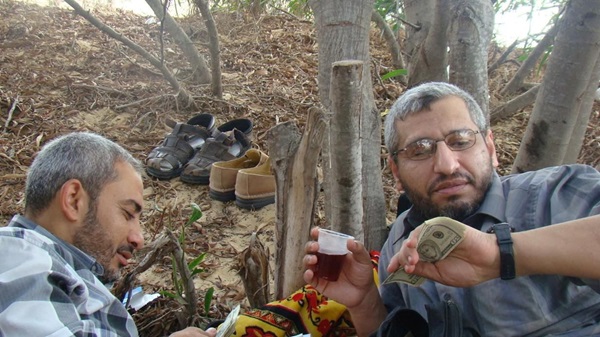 Picture said to show leader of Hamas' military wing, known as Al-Qassam Brigades, Mohammed Deif in a location given as Gaza Strip in this handout picture released on 7 January 2024;
Credit: Israel Defense Forces/Handout via Reuters/File Photo
Picture said to show leader of Hamas' military wing, known as Al-Qassam Brigades, Mohammed Deif in a location given as Gaza Strip in this handout picture released on 7 January 2024;
Credit: Israel Defense Forces/Handout via Reuters/File Photo
CAIRO/JERUSALEM (Reuters) -The head of Hamas' military wing, Mohammed Deif, was killed in an Israeli airstrike in Gaza last month, the Israeli military said on Thursday 1 August 2024, a day after the group's political leader was assassinated in Tehran.
Deif is believed to have been one of the masterminds of Hamas' 7 October attack on southern Israel that triggered war in the Palestinian enclave.
"The IDF [Israel Defence Forces] announces that on 13 July 2024, IDF fighter jets struck in the area of Khan Yunis, and following an intelligence assessment, it can be confirmed that Mohammed Deif was eliminated in the strike," the military said.
Hamas neither confirmed nor denied the killing of Deif, but one official, Ezzat Rashaq, said any word on deaths of its leaders was its responsibility alone.
"Unless either of them [the Hamas political and military leadership] announces it, no news published in the media or by any other parties can be confirmed," Rashaq said.
The Israeli announcement came as crowds gathered in the Iranian capital for the funeral procession of Hamas' political leader, Ismail Haniyeh.
Iran and Hamas have blamed Haniyeh's killing on Israel, which has neither denied nor confirmed a role in the assassination. Israel did however confirm it killed a senior commander of the Lebanese Hezbollah movement in Beirut on Tuesday 30 July 2024.
Hezbollah and Hamas are backed by Iran. The latest killings have raised concern of a further escalation in hostilities in the Middle East, with threats of revenge against Israel, which has said it does not seek regional war but that it would respond forcefully to any attack.
"Israel is in a state of very high readiness for any scenario – on both defence and offence," Prime Minister Benjamin Netanyau said following a meeting with the Home Command. "We will exact a very high price for any act of aggression against us from any quarter whatsoever."
String of deaths
On Thursday, Hamas official Sami Abu Zuhri said Haniyeh's death would not weaken the group's fighters in Gaza. "Despite the crime, Hamas remains strong and the confrontation in Gaza is continuing," he said.
His death was the latest in a series that has targeted the group's leaders. Haniyeh's deputy, Saleh al-Arouri, was killed in a drone strike in Beirut in January. In March, Israel said it had killed Marwan Issa, Deif's deputy.
The United States confirmed Issa's death in an Israeli operation. Hamas has neither confirmed nor denied his death.
Israeli Defence Minister Yoav Gallant said Deif's death was a milestone in Israel's goal of destroying Hamas' military wing, known as Al-Qassam Brigades. "Hamas is disintegrating," Gallant said on X. "Hamas terrorists may either surrender or they will be eliminated."
One of Hamas' most dominant figures, Deif rose through the group's ranks over 30 years, developing its network of tunnels and its bomb-making expertise.
He has topped Israel's most wanted list for decades, held personally responsible for the deaths of dozens of Israelis in suicide bombings. Scores of Palestinians were killed in the airstrike that killed him, medics in Gaza say.
The other mastermind of the 7 October attack, Yahaya Sinwar, is still believed to be directing military operations, possibly from bunkers beneath Gaza, while playing a leading role in indirect negotiations with Israel for a prisoner swap deal.
But now on the 300th day of warfare in Gaza, hopes for a hostage deal and ceasefire have dimmed.
The war erupted when militants led by Hamas stormed southern Israel on 7 October, killing 1,200 people, most of them civilians, and taking around 250 hostages back to Gaza, according to Israeli tallies.
The Gaza health ministry says more than 39,400 Palestinians, most of them civilians, have been killed in the subsequent Israeli offensive. The ministry does not distinguish between militants and civilians in its fatality reports.
Israel has lost 329 soldiers in Gaza and says around a third of the Palestinian dead are fighters.
On Thursday, as the Israeli military continued its operations in Gaza, forces hit a school in the area of Shejaia in Gaza City, killing at least fifteen people and wounding 29, according to Palestinian emergency services.
The military said it had targeted fighters operating in a compound within the school that it said was used as a hideout for Hamas commanders and fighters. Hamas has denied Israeli accusations it operates from civilian facilities such as schools and hospitals.
Elsewhere in the enclave, strikes against a car and a house in central Gaza killed at least thirteen people, while tanks pushed into the Al-Maghazi area, where one of the strikes took place.
Earlier, Israeli authorities released fifteen Palestinians whom it had detained in the past months in Gaza. The men arrived for treatment at a Gaza hospital, complaining of abuse during their detention. Israel denies torture and is investigating suspected abuse of detainees.








